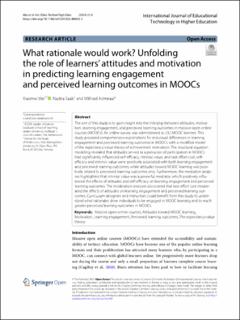| dc.contributor.author | Wei, Xiaomei | |
| dc.contributor.author | Saab, Nadira | |
| dc.contributor.author | Admiraal, Wilfried | |
| dc.date.accessioned | 2024-01-24T08:47:41Z | |
| dc.date.available | 2024-01-24T08:47:41Z | |
| dc.date.created | 2024-01-22T07:46:32Z | |
| dc.date.issued | 2024 | |
| dc.identifier.issn | 2365-9440 | |
| dc.identifier.uri | https://hdl.handle.net/11250/3113479 | |
| dc.description.abstract | The aim of this study is to gain insight into the interplay between attitudes, motiva- tion, learning engagement, and perceived learning outcomes in massive open online courses (MOOCs). An online survey was administered to 232 MOOC learners. This study provided comprehensive explanations for individual differences in learning engagement and perceived learning outcomes in MOOCs with a modified model
of the expectancy-value theory of achievement motivation. The structural equation modeling revealed that attitudes served as a precursor of participation in MOOCs
that significantly influenced self-efficacy, intrinsic value, and task effort cost; self- efficacy and intrinsic value were positively associated with both learning engagement and perceived learning outcomes, while attitudes toward MOOC learning was posi- tively related to perceived learning outcomes only. Furthermore, the mediation analy- ses highlighted that intrinsic value was a powerful mediator, which positively influ- enced the effects of attitudes and self-efficacy on learning engagement and perceived learning outcomes. The moderation analyses discovered that task effort cost moder- ated the effects of attitudes on learning engagement and perceived learning out- comes. Curriculum designers and instructors could benefit from this study to under- stand what rationales drive individuals to be engaged in MOOC learning and to reach greater perceived learning outcomes in MOOCs. | en_US |
| dc.language.iso | eng | en_US |
| dc.rights | Navngivelse 4.0 Internasjonal | * |
| dc.rights.uri | http://creativecommons.org/licenses/by/4.0/deed.no | * |
| dc.title | What rationale would work? Unfolding the role of learners' attitudes and motivation in predicting learning engagement and perceived learning outcomes in MOOCs | en_US |
| dc.type | Peer reviewed | en_US |
| dc.type | Journal article | en_US |
| dc.description.version | publishedVersion | en_US |
| cristin.ispublished | true | |
| cristin.fulltext | original | |
| cristin.qualitycode | 1 | |
| dc.identifier.cristin | 2231548 | |
| dc.source.journal | International Journal of Educational Technology in Higher Education | en_US |
| dc.source.volume | 21 | en_US |

